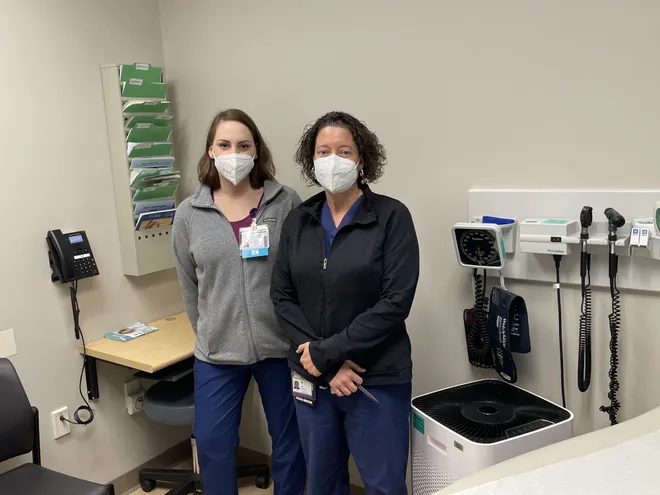Source: https://www.worcestermag.com/story/lifestyle/2022/04/05/kennedy-health-puts-spotlight-transgender-health-needs/7249224001/
Until recently, it wasn’t unusual for transgender patients to wait weeks or even months for an appointment at Worcester’s Edward M. Kennedy Community Health Center.
“When we got calls from trans folks, it would be just me trying to figure out when I could see them,” said Dr. Anna McMahan, who had been the sole PCP treating transgender patients since she joined Kennedy in 2016. Patients’ only other option would have been traveling to the Boston or Springfield areas for gender-affirming healthcare such as hormone replacement therapy or behavioral and surgery referrals.
After two years of work, Kennedy Community Health Center launched its new Transgender Health Team this past October.
“There was a real dearth of trans care in Central Massachusetts,” said McMahan, one of the main healthcare providers.
Worcesterite Jake Dziejma agreed — he currently travels to a trans health center in Western Massachusetts, over an hour away. “For a city that touts itself as being the second largest in New England, it can be really challenging to simply find competent care as a trans person,” he said, adding that a local option for healthcare would be welcomed by the trans community.
The team currently consists of McMahan and two other main primary care providers, as well as a registered nurse, a community health worker and a medical assistant. As patient numbers continue to rise, the team in turn will keep expanding to absorb the growing caseload. According to McMahan, the support of a dedicated staff has made a night and day difference.
Now, when a patient calls, they can reach the team through a phone line going directly to registered nurse Sarah Caplette and Community Health Worker Claire Powell. While it may seem minor, such a change breaks down yet another barrier to gender affirming healthcare. “Patients don’t have to continuously out themselves,” said Caplette, as they go through various phone transfers before actually reaching their PCP.
About two years ago, McMahan began lobbying for greater support for transgender affirming care, rather than handling each on a case by case basis. “We can see that when people don’t get gender affirming care, they have worse health outcomes overall,” said McMahan.
The mission of Kennedy Community Health Center is to specifically help those who are marginalized and would not otherwise receive the care they need. With that in mind, McMahan argued that the clinic had a responsibility to do something. “I was able to go to the leadership team and say ‘look, this is a group of people who have worse health outcomes and we can help with that.’”
Clinic leadership readily agreed, having long been committed to LGBTQ+ healthcare, and work began in earnest to build the new initiative into the budget. In fact, Kennedy Community Health Center has earned a top score as a LGBTQ+ Healthcare Equality Leader in the Human Rights Campaign Foundation’s Health Equity Index for the last five years. It is the only healthcare provider in Central Massachusetts to receive this designation.
Fast-forward to the present day, and “it’s going gangbusters,” said McMahan happily. The rise in patient numbers, she said, doesn’t necessarily represent a demographic change so much as a cultural one.
“It’s not that there are more trans people now than there ever were, but a slightly improved comfort level in being able to say that out loud,” she said. “Still a long way to go but better than it has been historically.”
Worcester resident Maeve Perry is not surprised that Kennedy has seen a rise in patients – and agreed with McMahan’s analysis that more people are able to live visibly. Perry likened it to the stigma that used to surround left-handed students in schools, as teachers forced them to use their right hands. “Once the restriction was lifted, the number of left-handed people shot up in the short term” before stabilizing, she said. A similar phenomenon could be happening with gender identity, aided by the pandemic encouraging self reflection and social media helping spread educational information. “Numbers are bound to go up.”
However, Dziejma emphasized that acceptance — while essential — is only half the battle. “Trans people need to know that healthcare centers are, one, not hostile and, two, that they actually have the medical knowledge to back that up,” said Dziejma, who had just changed PCPs because “while providers were good people, they didn’t have specific trans knowledge.”
Perry believes that hormone replacement therapy is relatively under-researched, which contributes to a lack of knowledgeable specialists. One HRT clinic she reached out to had only one doctor who could write the necessary prescriptions for adults.
Kennedy Health Center did not lack for knowledgeable staff, and brought them in from other parts of the organization, beginning with Caplette and Powell. While Caplette handles all medical aspects, as a CHW, Powell deals with non-medical issues that could directly affect a patient’s health.
“Everybody who is a CHW is going to have a different definition of what that is,” said Powell, who explained that she works with the social aspects surrounding trans affirming healthcare, such as housing, food as well as “a lot of really specific bureaucratic aspects that affect trans folks,” such as name changes.
Perry agreed that name changes were difficult, requiring repeated travel, a $200 fee, and months of waiting. “And that’s before talking to banks, credit cards, social security and everything else.” She also says she is planning to ask WPI for a new diploma with her correct name.
Despite the headache, Perry says she still has it easier than many. “I’m a white woman with a college degree, with a car and license, so even in the worst case, I’m good. BIPOC trans people, unfortunately, have it the worst in these kinds of situations.” Services like those offered at Kennedy could be a step forward in combating the race and class based access issues that arise in these situations, she said.
This speaks to the larger mission of equity at Kennedy Community Health Center — of which the new transgender health team is a part of — that everyone is entitled to healthcare, regardless of socio-economic status, race, sexual orientation or gender identity. And the team at Kennedy Center will be coordinating with similar teams across Massachusetts, sharing knowledge and practices.
“We want people to come get excellent care,” said McMahan, “regardless of how they identify.”



